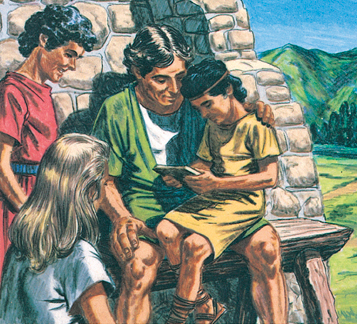But before he died, Jared had a son by the name of Enoch.
Genesis 5:21-24 KJV
[21] And Enoch lived sixty and five years, and begat Methuselah:
[22] And Enoch walked with God after he begat Methuselah three hundred years, and begat sons and daughters:
[23] And all the days of Enoch were three hundred sixty and five years:
[24] And Enoch walked with God: and he was not; for God took him.

Genesis 5:21
And Enoch lived sixty and five years, and begat Methuselah:
And then did Enoch die?
No! He did not die. This is a dark chapter, but here is the bright spot in it. Apparently, Enoch was 65 years of age when he was converted and entered into this Divine fellowship.
The name “Methuselah” means: “The Deluge (the flood) shall be sent when he is dead”
So, Methuselah was a living, walking testimony that judgment was coming upon the Earth because of its terrible wickedness. However, only Noah and his family believed. So the flood came a little less than a thousand years after Methuselah was born.
We read that Enoch lived sixty-five years, and begat Methuselah, and after that he walked with God. I do not know what the first sixty-five years of his life were. I assume that he was like the rest of the crowd—this was a very careless period, moving now into the orbit of the days of Noah.
But when that little boy Methuselah was born, Enoch’s walk was changed. Perhaps, that baby turned him to God.
Aside from Adam, Seth, and Noah, two of the most famous names in this chapter of genealogy are Enoch and Methuselah. Enoch fathered Methuselah at the age of just 65, a relatively young age for this passage.
Methuselah’s name has a dual meaning: it can be interpreted as “man of the dart,” or as “his death brings judgment.” According to this chapter, Methuselah will die in the same year as the flood.
Both men represent an interesting extreme within this chapter.
Enoch’s lifespan is the shortest recorded for these patriarchs. At “only” 365 years, he was on earth less than half as long as others in his family. However, Enoch’s is the only story which does not end with the repeated phrase, “and he died.”
Rather, verse 24 simply says that God “took” Enoch. While we’re not entirely sure what it means, the contrast to every other man listed in this genealogy is striking.
Most likely, this was an event similar to what happens to Elijah at the end of his ministry: taken bodily by God prior to a natural death (2 Kings 2:9–12).
Methuselah, on the other hand, is credited with the longest lifespan of any person in the Bible: 969 years! Methuselah will also be the first of the patriarchs listed here to live until the year of the great flood.
Each generation continues to pass on to the following one the image of God, as well as their own human likeness, as Adam did with Seth and his other sons and daughters (Genesis 5:3).
In addition, this line of Seth seems to be passing on a commitment to walking with and worshiping God. This is important in the context of the upcoming flood. The only people saved from that catastrophe were those of this very line.

Genesis 5:22
And Enoch walked with God after he begat Methuselah three hundred years, and begat sons and daughters:
Three statements are made in the Bible respecting Enoch: “he walked with God” [Gen. 5:22]; “he witnessed for God” [Jude, Vs. 14]; “he pleased God” [Heb. 11:5]. Enoch did not live a life of isolation, but he did live a life of separation.
This is one of the most remarkable things, that in the midst of death one man is removed from this earth. It is said of Enoch that he “walked with God.” This is quite remarkable, by the way.
Only two men are said to have walked with God. In the next chapter, we find that Noah also walked with God. These were two antediluvians, which means “before the flood” and they walked with God.
This is demanded of all Believers.
This verse is the first to break with the pattern seen so far. As usual, we are given the number of years that a man lived after fathering the son who would lead to Noah and his children.
This time, though, we’re told something about that man: Enoch “walked with God,” a fact that will be repeated in the surprising verses to follow. In the Bible, the expression “walked with God” refers to someone who is obedient and devoted to the Lord, resulting in His favor.
In Enoch’s case, this was so vital a point that it’s mentioned twice: both here and in verse 24.
This passage is primarily intended to explain the family tree from Adam to Noah, so there are few other details given. We really don’t know much about Enoch. However, we do know that God chose to remove him from earth prior to his natural death.
Enoch is the first of the men listed in this chapter whose story does not end with the phrase “and he died.” This was probably an event similar to the end of Elijah’s ministry, when he was taken bodily by God into heaven (2 Kings 2:9–12).
Genesis 5:23
And all the days of Enoch were three hundred sixty and five years:
Converted at 65 years old, he faithfully lived for God some 300 years. My fellow Christian Siblings, sometimes God puts a baby in a family just for that purpose, and if that baby will not bring you to God, nothing else will.
For three hundred years after that he walked with God, and he begat other children, sons and daughters. “And all the days of Enoch were three hundred sixty and five years”—that is how long he was on this earth, but he did not die.
According to this verse, all of the days of Enoch were 365 years. To this point, the youngest listed age at death has been 895 years old. What happened? The Bible gives no details, other than God was the one responsible, and Enoch did not die.
The next verse will tell us what little there is to know. One important piece of information comes from what the Bible does not say about Enoch.
All the prior men of Noah’s heritage were described with the same basic information, including the concluding phrase, “and then he died.” Physical death was the primary, and most obvious effect of the fall of man.
Enoch, however, will not be described using that phrase. Rather, as the next verse shows, he seems to have been taken, prior to death, by God directly. This is probably similar to what happened at the end of Elijah’s ministry (2 Kings 2:9–12).

Genesis 5:24
And Enoch walked with God: and he was not; for God took him.
There are actually only two men in the Old Testament who did not die. One of them is Enoch, and the other, of course, is Elijah. Enoch was translated, and as Paul said, “that he should not see death” [Heb. 11:5]).
Enoch is one of the few before the Flood of whom we have any record at all. We are told that he did not die but that God took him—he was translated.
What do we mean by translation?
Translation is the taking of a word from one language and putting it into another language without changing its meaning. Enoch was removed from this earth; he was translated. He had to get rid of the old body which he had.
He had to be a different individual—yet he had to be the same individual, just as the translated word has to be the same. It does not say, “And then Enoch died,” but it says, “And Enoch walked with God: and he was not; for God took him.”
Enoch was taken to heaven. I think that all the great truths here in Genesis are relevant to a subject under consideration. In my judgment, this is the picture of what is to come; here is the Rapture of the church.
Before the judgment of the Flood. God removes Enoch.
This is one of the most mysterious verses in the Bible. Considering how amazing and unusual this event is, we might have hoped for more details. And yet, every word of the Bible is focused on a particular purpose.
In this case, the real purpose is to explain the genealogy from Adam to Noah, through Seth. So far as that is concerned, exactly what happened to Enoch is beside the point.
What we do know is that Enoch “walked with God.” In fact, this is such a crucial part of who Enoch was that it’s repeated twice: here, and in verse 22.
To walk with God means to make a relationship with God part of your everyday lifestyle, to honor God with your choices in every aspect of life. His case is unusual in all of Scripture and, possibly, in all of human history.
The only other event which seems similar is when God did something similar to Elijah, who was taken to heaven by a whirlwind (2 Kings 2:9–12).
What does it mean that Enoch “was not, for God took him”? Apparently, in response to Enoch’s walking with God, God prevented Enoch from dying. God just took him away, instead.
Hebrews 11:5 says this: “By faith Enoch was taken up so that he should not see death, and he was not found, because God had taken him. Now before he was taken he was commended as having pleased God.”
This life of faith, Hebrews tells us, pleased God so much God prevented Enoch from passing from this life in the normal way.
Genesis 5:25
And Methuselah lived an hundred eighty and seven years, and begat Lamech:
Methuselah fathered Lamech at the age of a hundred eighty seven years of age. Noah will be born to Lamech.
The prior verses, describing the life of Enoch, were an unusual break from the normal pattern of this passage. Enoch is said—twice—to have “walked with God,” indicating a deep and obedient relationship.
Then, unique among all the men of this genealogy, Enoch is not given the summary phrase “and he died.” Rather, he is taken by God prior to his natural death. This occurs at the relatively young age of 365 years, making Enoch’s life the shortest recorded in this chapter.
Interestingly, the shortest life recorded in Genesis chapter 5 is that of the father of the longest life recorded in the entire bible: his son, Methuselah.
Here, in verse 25, the genealogy resumes its normal pattern. Enoch’s son, Methuselah, fathered his son Lamech at the age of 187 years old. It’s important to note that this Lamech, though he shares the same name as one of Cain’s descendants, is not the same man.
The man described as a murderer with two wives (Genesis 4:23–24), Lamech’s lineage was through Cain, Enoch (also not the same as the Enoch of this chapter), Irad, Mehujael, and Methushael (Genesis 4:17–18). Then, as now, most people were given names similar or identical to those others already had.
However, this common name also creates in interesting contrast. Cain’s descendant will revel in his own sin, while Seth’s descendant will mourn over the suffering caused by the fall of man (Genesis 5:29).

Genesis 5:26
And Methuselah lived after he begat Lamech seven hundred eighty and two years, and begat sons and daughters:
Methuselah fathered more sons and daughters seven hundred eighty two years after he fathered Lamech.
Methuselah is an important and poignant aspect of this part of the Genesis story line. Methuselah will survive until the very same year as the flood. In fact, at the time Methuselah was born, every one of his paternal ancestors was still alive!
According to the ages given in this passage, Adam did not die until Methuselah was more than 200 years old. And, his son, Lamech, was also born just prior to the death of Adam.
This means that there was an unbroken line of eyewitness history still thriving in the world. The wicked, evil world of Noah’s day knew exactly what their history was.
There were men and women walking the earth who had lived in direct contact with Adam himself.
Methuselah lives another 782 years after fathering Lamech, giving him time to father many, many other sons and daughters. This is also important, for a much sadder reason. It speaks to how widespread the corruption of man was by the time of Noah’s birth.
Cain’s descendants celebrated their own sin (Genesis 4:23–24). Seth’s line walked with God (Genesis 5:22–24), and grieved the state of the fallen world (Genesis 5:29). Sadly, at this point in the history of man, most people are not walking with God.
The vast majority of Methuselah’s family line are going to reject their Creator, and be destroyed in judgment.
Methuselah’s name, in fact, might have been a prophecy. It can be translated either as “man of the dart,” or as “his death brings judgment.” Using calculations from this chapter, the flood occurs in the same year as Methuselah’s death.
I hope that you have really enjoyed this post,
Please Leave All Comments in the Comment Box Below ↓













The lives of these Biblical men were many times longer than lives today.
What a blessing to live close to God for all that time. It is important to remember the relationship that The Old Testament people had with God, their creator. Their faithfulness seemed to bring long life, offspring and many blessing.
Thank you for reminding me of this part of the Bible.
Hello Anastazja,
Thank you for stopping by, taking the time to comment on this episode.
The reason Lifespans were so long back then can be found in
Genesis 6:3 KJV: And the Lord said, My spirit shall not always strive with man, for that he also is flesh: yet his days shall be an hundred and twenty years.
You are very welcome for the reminder,
Blessings My Friend!
I want to express my appreciation for sharing the thrilling story of Enoch, Jared’s son, on your website.
It’s fascinating to delve into the ancient narratives and gain insights into the lives of biblical figures. The story of Enoch is truly captivating, as it provides a unique perspective on faith, devotion, and the special relationship he had with God.
Enoch’s extraordinary journey, walking with God and ultimately being taken into heaven, is a testament to the power of unwavering faith and righteousness.
Exploring these ancient tales not only deepens our understanding of biblical history but also offers valuable lessons that can be applied to our own lives.
Enoch’s unwavering commitment to God’s Will and His embodiment of righteousness serve as inspirations for individuals seeking to strengthen their spiritual connection and live a purposeful life.
Hello Dave,
Thank you for taking the time to stop by and comment on The Thrilling Story Of Enoch – Jared’s Son episode.
Thank you for your appreciation for sharing of this information, as well as your addition to the subject at hand. Your comments are greatly appreciated as well.
It is a Blessing to receive this kind of feedback.
Blessings My Friend!
“The Thrilling Story of Enoch: Jared’s Son” on God in Our Lives Every Day is a captivating exploration of the life and legacy of Enoch from biblical times.
The article delves into the remarkable journey of Enoch, shedding light on his deep faith and unique relationship with God. It presents an intriguing narrative, highlighting the extraordinary events and divine encounters that shaped Enoch’s life.
Through vivid storytelling, the article paints a vivid picture of Enoch’s righteousness, his walk with God, and his eventual translation to heaven. It also delves into the lessons we can learn from Enoch’s story, emphasizing the importance of faith, obedience, and cultivating a close connection with the divine.
Whether you’re familiar with the biblical account of Enoch or encountering it for the first time, this article offers a thought-provoking and inspiring perspective on his life and spiritual journey. It serves as a reminder of the power of faith and the transformative impact it can have on our lives.
Thank you, Steve.
I appreciate you taking the time to let me know you stopped by. That is an excellent comment about The Thrilling Story Of Enoch – Jared’s Son being a captivating exploration of the life and legacy.
Your commentary about the article delving into the remarkable journey of Enoch is great. Thank you for saying this article offers a thought-provoking and inspiring perspective on Enoch’s life and spiritual journey, because some may not realize this.
This is an excellent comment though, and one of which I hope will help answer questions others may have.
Thank you again for stopping by and please come back and visit.
Blessings My Friend!
I was captivated by this fascinating article delving into the thrilling story of Enoch, the son of Jared.
You skillfully weave together historical context, biblical references, and insightful analysis to shed light on this often-overlooked figure in biblical narratives.
What stood out to me most about this article is the ability to bring the story of Enoch to life. Through vivid storytelling and meticulous research, the article transports readers to a different era, immersing them in the rich tapestry of Enoch’s experiences and encounters.
Your attention to detail and careful examination of ancient texts add depth and authenticity to the narrative, making it a compelling read.
I highly recommend this article to anyone interested in biblical history and the stories of lesser-known figures in ancient texts. The author’s meticulous research, engaging storytelling, and thoughtful analysis make it a compelling and enlightening read.
Through the lens of Enoch’s life, readers can gain a deeper understanding of faith, spirituality, and the profound connection between humanity and the divine.
Hello Pasindu,
Thank you for continuing to comment on pages on this HBS & DwJ website, which in turn, becomes HBS & DwJ Podcast Episodes.
I really want to express my sincere appreciation about you being captivated by this fascinating article, and by the way, thank you for describing this information, portion of Holy Bible Study, that way.
Attention to the details are very key to me. There are often many clues in the formation of a story being told, in the details. The Thrilling Story Of Enoch – Jared’s Son, definitely provides a unique perspective on faith.
Thank you again for your continued comments, it is Truly a Blessing to receive this kind of feedback.
Blessings My Friend!
I want to express my sincere appreciation for sharing the thrilling story of Enoch, Jared’s son, on your website.
This captivating tale of adventure and resilience has truly captivated my imagination and left me wanting to learn more about Enoch’s extraordinary life.
The way you have brought his story to life through vivid descriptions and engaging storytelling is commendable. It is thanks to platforms like yours that lesser-known historical figures like Enoch can receive the recognition they deserve.
I am grateful for the opportunity to have read this incredible story and look forward to exploring more fascinating narratives on your website in the future.
Thank you for sharing this remarkable piece with your readers.
Hello Herman,
Thank you for taking the time to check out more episodes on the HBS & DwJ website.
I really appreciate you considering this Holy Bible Study a captivating tale of adventure and resilience. Holy Bible Study is where I have really tuned in to my spirituality and developed a closer relationship with GOD.
I am very thankful that GOD Loves us so much that He allowed His Only Begotten Son to lay His life down, shedding His Precious Blood on Yonders Cross, taking on the sins of the whole world. Even taking on the sins of us who had not even been born at the time, continuing to mediate on the behalf of us all.
My personal relationship with GOD is the most important relationship I can have in life. Spirituality is a must for this type relationship.
Thank you so much for your comments, they are greatly appreciated.
Blessings My Friend!